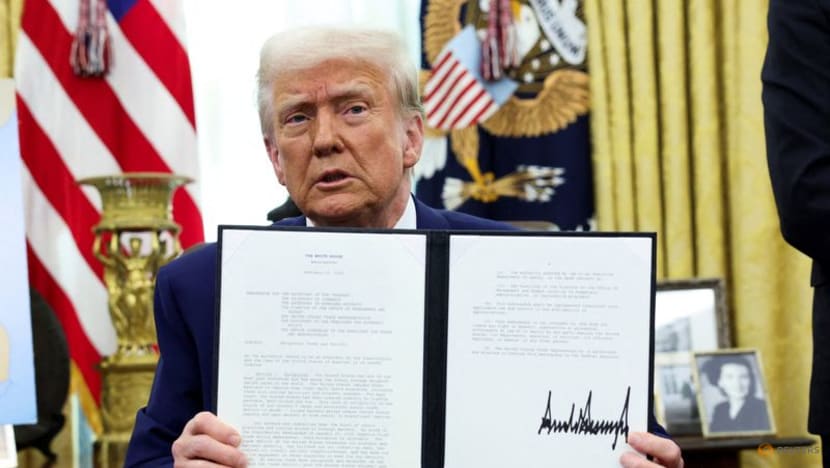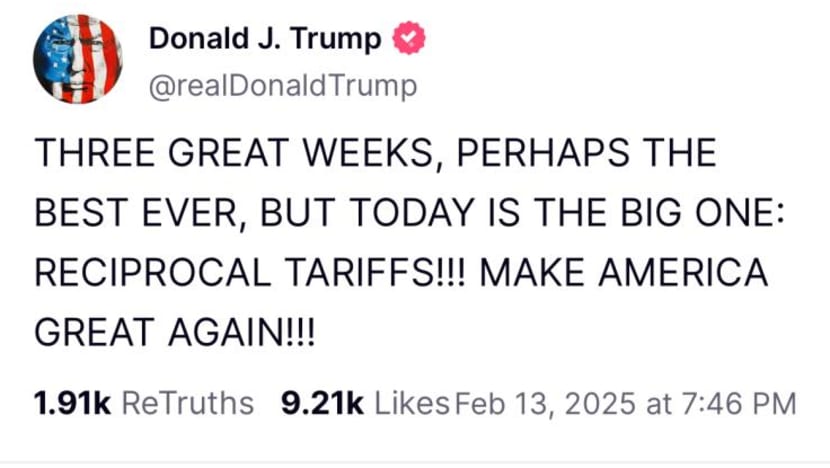Snap Insight: Trump’s reciprocal tariffs put Asia’s history of trade openness at risk
US President Donald Trump’s trade policies will leave the rest of the world to decide whether to abandon economic integration or follow America’s example, says Deborah Elms of the Hinrich Foundation.

U.S. President Donald Trump holds an executive order about tariffs increase in the Oval Office of the White House in Washington, U.S., February 13, 2025. REUTERS/Kevin Lamarque

This audio is generated by an AI tool.
SINGAPORE: Another day at the White House, another memo signed about trade. On Thursday (Feb 13), United States President Donald Trump unveiled “reciprocal tariffs” that could hit both American allies and competitors.
Audiences were primed for an explosive event with Mr Trump himself saying that it was a big day in his three-week-old term.

Early reviews have been decidedly mixed. While Mr Trump did not announce the sudden application of tariffs against everyone starting Monday, his rather bland memo set in motion much more troubling policy changes that will dramatically reshape the global economic environment.
Mr Trump has long argued that the global trade and economic system is unfair to the US. He has aired a variety of grievances, but one point has captured his attention – the fact that each country has a different tariff schedule.
What he is now aiming to do is to reset this structure by applying “reciprocal tariffs”. This means if Country A charges a 10 per cent tariff on incoming phone cases while the US charges only 3 per cent on the same product, the US will start to apply a reciprocal tariff of 10 per cent for Country A.
The complexity of such a system is mindboggling. There are currently 12,500 tariff lines in the US domestic schedule. There are 165 other countries in the World Trade Organization. If each line were adjusted by partner, the US will be administering over 2 million tariff variations.
RISK AND UNCERTAINTY OF TRADING WITH THE US
But the memo released by Mr Trump goes further to bundle five different categories into a final “tariff”: Current level of tariffs applied to US goods; unfair taxes imposed (like value-added tax and goods and services tax); costs to US businesses and consumers of other country’s policies, subsidies and exchange rates; and any other practices the US trade representative’s office deems unfair.
All of these points are to be tackled in a sweeping report delivered on Apr 1, paving the way for new reciprocal tariffs to be applied starting as soon as Apr 2.
Assessing the consequences of this new policy is nearly impossible beyond broad points. The US has upended the current trading system that has existed since the 1940s. It is clear the US is not interested in anything but unilateral trade policy, leaving the rest of the world to decide whether to abandon economic integration or follow America’s example.
The concept of reciprocal tariffs has injected maximum uncertainty into trade with the United States. There is simply no way to know, in advance, the final tariff any product from any trade partner might face at the border.
It may be that individual countries, sectors or firms never have a reciprocal tariff applied. Or it may be that deft negotiations will not be sufficient to stave off new charges.
Asia has a long history of trade engagement and economic openness, which has powered domestic economic growth. This is potentially at risk in the wake of Mr Trump’s latest actions. A new roulette wheel of tariff applications will be very challenging to navigate.
Deborah Elms is Head of Trade Policy at Hinrich Foundation and Founder of the Asian Trade Centre.


















